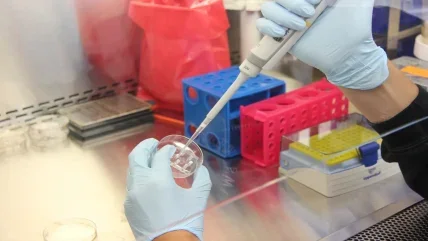
Avicenna Biosciences and Molecure have announced a research collaboration aimed at accelerating the discovery and development of small molecule drugs targeting ubiquitin-specific protease 7 (USP7).
USP7 is a deubiquitinase, which is associated with various cancers.
Molecure is a biotechnology company based in Poland that focuses on discovering and developing drugs up to the clinical stage. The company utilises its expertise in medicinal chemistry and biology to identify and develop novel small-molecule drugs targeting previously unexplored protein and RNA targets, with the aim of addressing various incurable diseases.
Avicenna Biosciences, on the other hand, has created a machine learning (ML)-driven medicinal chemistry platform designed to accelerate the lead-to-drug optimisation process.
Their partnership will leverage Molecure’s expertise in drug discovery and USP7 biology alongside Avicenna Biosciences’ machine learning-driven medicinal chemistry platform to identify new drug candidates with enhanced pharmaceutical properties.
Molecure CEO Marcin Szumowski said: “By combining Molecure’s in-depth knowledge of this attractive, validated in vivo target with Avicenna’s ML-driven medicinal chemistry platform, we intend to generate superior drug candidates with optimal pharmacological profiles for further preclinical and clinical development.”
USP7 has been identified as a promising target in cancer research due to its role in regulating the stability of proteins crucial for tumour suppression and immune response.
According to the agreement, Avicenna Biosciences will develop algorithms to discover new chemical entities that inhibit USP7 and meet specific pharmacological criteria.
Molecure will handle the synthesis and evaluation of these entities, selecting candidates for further development. The Polish firm will have the rights to develop and commercialise any novel drug candidates that emerge from the collaboration.
Avicenna Biosciences will receive an upfront payment and research funding, which will be contingent upon the compounds meeting predefined success criteria.
Should Molecure choose to license the developed molecules, Avicenna Biosciences will also be eligible for licensing fees and will retain a share of the future revenues generated by the Polish biotech company’s drug candidates.
Avicenna Biosciences president and CEO Chris Meldrum said: “We have been very impressed with the Molecure team, their deep expertise in targeting USP7, and their efforts to deliver new treatment options to patients with difficult-to-treat cancers.
“Avicenna welcomes the challenge to transform chemical potential to biological and clinical reality for this important target.”






